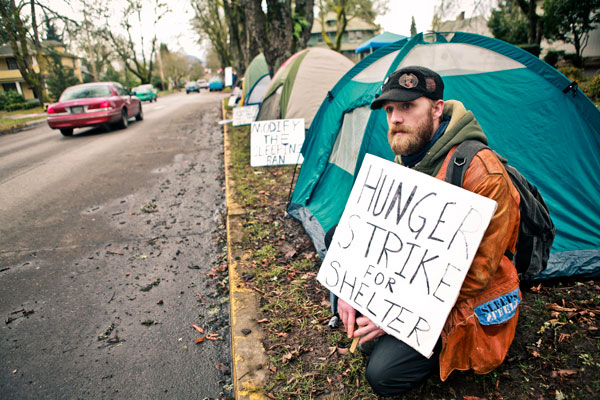Conrad Barney started a hunger strike Dec. 11 to protest the treatment of the homeless. He says he’s been roused by the police while sleeping, and it’s different from waking up housed. “You’re in this state where you’re tired. It’s Oregon, and it’s wet and cold. When you find a place, if you’re uprooted from that place, you have to start from the drawing board to find another place,” he says. “When you’re running on no sleep and still having to be moving around, active, carrying lots of weight — because you have to have your house on your back — it takes its toll.”
Homeless rights advocates created SLEEPS (Safe Legally Entitled Emergency Places to Sleep) in opposition to Eugene’s anti-camping code, which criminalizes taking shelter in a tent or sleeping bag or using a heater or fire on public property. SLEEPS and other activists say it’s inhumane to criminalize sleeping.
“I don’t think it’s controversial in the general public,” SLEEPS’ Jean Stacey says of repealing the camping ban. “I think it’s very hard. EPD [Eugene Police Department] can’t move on its own. It has to be instructed by the council.” That’s why SLEEPS has repeatedly set up “pop-up protest camps” (houseless and housed people sleeping in temporary tents) at City Council meetings and held the names of 28 homeless people who have died in the last year at the 2013 state of the city address. Stacey says that the police often prioritize serious crimes over addressing homeless people sleeping, but when it’s slow, they say they have to address laws being broken.
SLEEPS often conveys its message via erecting the pop-up camps in prominent places to protest the anti-camping code. “We’ve been evicted out of some of the best places in town,” Stacey says. “We’ve been 86’ed out of the federal building, the court building, the city building and several other city properties.” The city finally recognized SLEEPS’ right to use tents as part of their free speech at their current site at the vacant Trude Kaufman Senior Center — as long as they’re not using the tents to sleep at night.
Stacey says one thing the public needs to know is how arbitrary the anti-camping law is. “Why do we think it is OK for a person to lie naked on this lawn and go to sleep, but we don’t think it’s OK for them to crawl in a sleeping bag and sleep?” she asks. “And that’s really what the law says: You can sleep here, as long as you only have your clothes, but if you use a sleeping bag or a tent, now you’re a criminal with a criminal record for Trespass 2. Wonderfully logical.”
Before its winter 2012 recess, City Council approved a pilot program that would use Conestoga huts — inexpensive wagon-like housing about 6 feet by 10 feet — to house some homeless people beginning around April or June. SLEEPS and others say that’s a positive development, but doesn’t solve the sleeping problem for those who are on the streets now.
On top of keeping the camping ban in the news, SLEEPS is hopeful that recent court rulings will help make sleeping easier for the homeless. Lavan v. City of Los Angeles created the ruling that homeless people’s belongings can’t be simply trashed when they leave for a short time to seek services, for example; items must be inventoried and stored.
Stacey says that right now it costs less to clean up dispersed homeless camps with work crew and supervisor than it would to maintain a camp with sanitary conditions. “This is going to turn the financial picture around again,” Stacey says, “and we think it will make it more cost-effective now, not just good policy but more cost-effective policy, to actually get toilets.” She says this is especially true if the police agencies have to clean and dry items like bedding.
Some reports have identified SLEEPS as part of Occupy, but Stacey, who was also active in Occupy Eugene (OE), says the two groups are completely separate, and it’s important to public perception that they stay that way. “Every time we’re identified with Occupy, we lose 40 points” on an imaginary scale, she says. OE suffered in public opinion because it couldn’t identify one clear, cohesive message, and Stacey wants SLEEPS to learn from that institutional error.
 |
|
Conrad Barney. Photo by Todd Cooper.
|
“Everyone is here for a single mission to which they are passionately committed,” Stacey says, “and that doesn’t mean we don’t have all sorts of conflict and internal dialogue and resolution and re-conflict; we do, but we’re small, we’re extremely focused.”
Meanwhile, Conrad Barney has dropped from about 210 pounds to 170. His attitude about his hunger strike is positive and he says that hunger and exhaustion come in waves, but his face is more strained one month in than after 15 days. “The point for me is mainly awareness. It seems like the job’s getting done, which is good,” Barney says. “I’m anxious to have some results and end my hunger strike.”
